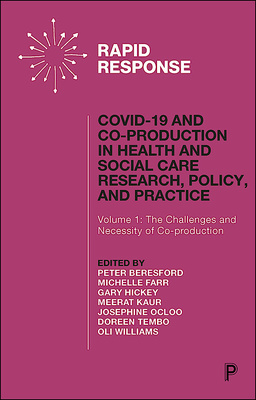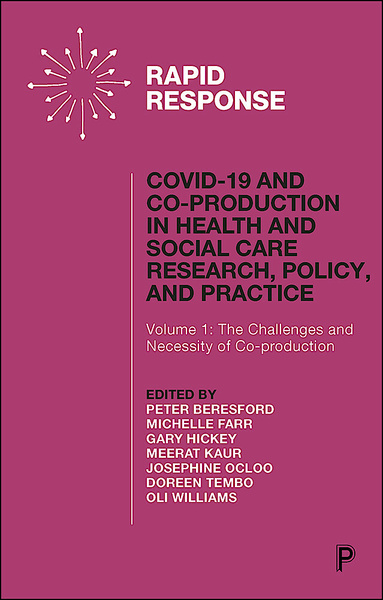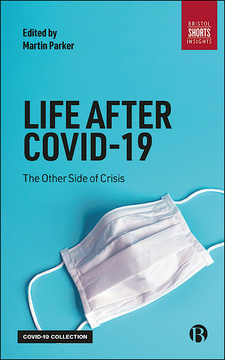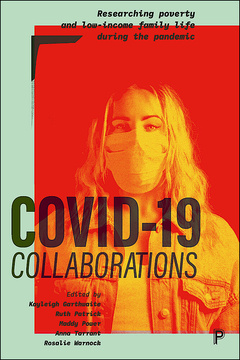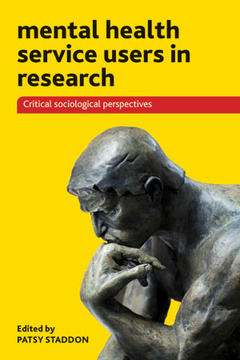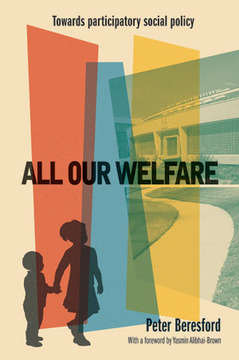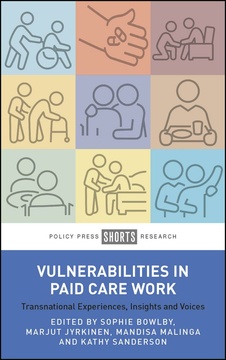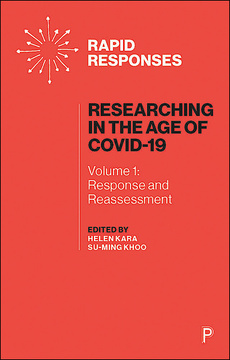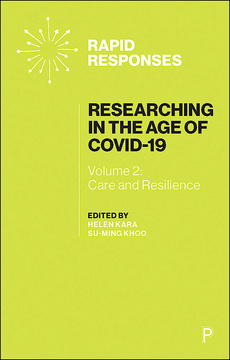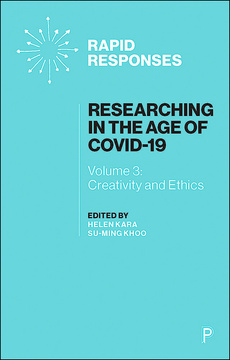COVID-19 and Co-production in Health and Social Care Research, Policy, and Practice
Volume 1: The Challenges and Necessity of Co-production
Edited by Peter Beresford, Michelle Farr, Gary Hickey, Meerat Kaur, Josephine Ocloo, Doreen Tembo and Oli Williams
Published
May 24, 2021Page count
160 pagesISBN
978-1447361770Imprint
Policy PressPlease note this title is not available in print. You can browse the digital copy on Bristol University Press Digital.
In the Media
Book launch & Talk: 'Covid-19 and Co-production in Health and Social Care Research'
Co-Production Collective: 'Our Co-produced Book Review is Here'
THIS.Institute: 'COVID-19 and Co-production in Health and Social Care Research, Policy, and Practice'
On our blog: Co-production: Working together towards a fairer future
EPDF and EPUB available Open Access under CC-BY-NC-ND licence. Groups most severely affected by COVID-19 have tended to be those marginalised before the pandemic and are now largely being ignored in developing responses to it.
This two-volume set of Rapid Responses explores the urgent need to put co-production and participatory approaches at the heart of responses to the pandemic and demonstrates how policymakers, health and social care practitioners, patients, service users, carers and public contributors can make this happen.
The first volume investigates how, at the outset of the pandemic, the limits of existing structures severely undermined the potential of co-production. It also gives voice to a diversity of marginalised communities to illustrate how they have been affected and to demonstrate why co-produced responses are so important both now during this pandemic and in the future.
“These new books from Policy Press provide a feast of ideas for anyone keen to employ co-production in healthcare research.” THIS.Institute
“Considering this book has been produced by many authors in a very short time, it is well-written, feels cohesive and showcases many powerful examples of the impact of the pandemic on real lives.” Co-production Collective
“This book should be essential reading for all of us working in the fields of health, social work and social care… there is no doubt we have much work to do and this book will be an ally and a friend to all those committed to this work.” British Journal of Social Work
Editorial Statement on Editor Order
The order in which editors or authors’ names appear on publications comes with specific assumptions and conventions in academic settings. Specifically, the convention is that the order reflects who had the most influence on the work or who made the greatest contribution or indeed who has the highest status in academia. There was tension between these academic and publishing norms and the participatory and collaborative approaches promoted and practiced by the editors of this collection. These norms can perpetuate the exclusion of those who are already marginalised and largely ignore how structural inequalities render simplistic notions of meritocracy unfit for resolving inequities in academic publishing. Given this context and due to the varied but significant contributions made by all of the editors in this book, and in the spirit of collaborative and equitable ways of working, a pragmatic compromise was made to write the names of the editors alphabetically by surname; A-Z for volume 1 and Z-A for volume 2.
Peter Beresford, OBE is Visiting Professor at the University of East Anglia, Co-Chair of Shaping our Lives and Emeritus Professor at Brunel University London and Essex University.
Michelle Farr is a Research Fellow at the National Institute for Health Research (NIHR) Applied Research Collaboration West at the University of Bristol.
Gary Hickey is Senior Research Fellow in the Research Design Service South East at the University of Brighton and Senior Public Involvement Manager at the Wessex Institute at the University of Southampton.
Meerat Kaur is part of the Centre for Engagement and Dissemination at the National Institute for Health Research (NIHR), and an advisor on collaborative approaches for diverse statutory, and community and voluntary organisations.
Josephine Ocloo is a Senior Researcher and Diversity and Inclusion lead for the National Institute for Health Research (NIHR) Applied Research Collaboration, South London, based at the Centre for Implementation Science (CIS) at King’s College London.
Doreen Tembo is a Senior Research Manager at the UK National Institute for Health Research (NIHR) Evaluation Trials and Studies Coordinating Centre at the Wessex Institute at the University of Southampton.
Oli Williams is a Postdoctoral Research Fellow based at King’s College London and funded by the Health Foundation’s grant to the University of Cambridge for The Healthcare Improvement Studies (THIS) Institute.
The Challenges and Necessity of Co-production: introduction to volume 1 ~ Peter Beresford, Michelle Farr, Gary Hickey, Meerat Kaur, Josephine Ocloo, Doreen Tembo, Oli Williams [authors listed alphabetically]
Section 1: The impact of existing structures
Whose views, and lives, truly count? The meaning of co-production against a background of worsening inequalities ~ Savitri Hensman
Silenced Voices, Unequal Impact: addressing health inequities and discrimination in co-producing health and care during the pandemic and beyond ~ Josephine Ocloo
Co-producing and funding research in the context of a global health pandemic ~ Gary Hickey, Alison Allam, Usha Boolaky, Tess Mc Manus, Sophie Staniszewska, Doreen Tembo
Are we there yet? Co-production and Black Thrive's journey towards race equity in mental health ~ Natalie Creary, Celestin Okoroji, Yasmin Ibison, Lela Kogbara, Jacqui Dyer
Finding the voice of the people in the pandemic: an ethnographic account of the work of local Healthwatch in the first weeks of England’s COVID-19 crisis ~ Giulia Zoccatelli, Amit Desai, Graham Martin, Sally Brearley, Glenn Robert
Co-production? We do community participation: experiences and perspectives in the context of the COVID-19 crisis from Latin America ~ Cristian R. Montenegro and Felipe Szabzon
Sovereigns and servers: enablers and challenges to Sikh community-led activism during COVID-19 ~ Meerat Kaur, Harvinder Kaur Dulku, Bob Singh Virdee, Sarabjit Kaur
What Are We Clapping For? Sending people to die in social care. Why the NHS did this and what needs to happen next? ~ Peter Beresford
Section 2: Infection and (increasing) marginalisation
Disabled People's Deaths Don't Count: how a protected characteristic offered Disabled people little protection during this pandemic ~ Ellen Clifford and Mark Dunk
Realities of Welfare Reform Under Covid-19 Lockdown: what disabled and older people actually experience ~ The Secret Welfare Rights Worker
Against Violence and Abuse: gender-based violence and the need for co-production with women with experience ~ Sonia Braham, Naima Iqbal, Lucy Allwright, Ruth Atkinson, Cordelia Ruck
COVID-19 and multi-generational households: reflections on the experience of a diverse urban community in Wales ~ Amal Beyrouty, Mashmooma Din, Eva Elliott, Allan Herbert [authors listed alphabetically]
Drug use and street homelessness during a pandemic: synergetic working with a vulnerable population ~ Anne Campbell, Kathy Faulkner, Chris Rintoul, Iain Cameron
‘It's all right for you thinnies’: ‘obesity’, eating disorders, and COVID-19 ~ Lauren O’Connell, Fiona Quigley, Oli Williams, Helen West, Sophie Metolli, Harry Pitham
Co-production in emergency responses and the 'new normal': an afterword for volume 1 ~ Peter Beresford, Michelle Farr, Gary Hickey, Meerat Kaur, Josephine Ocloo, Doreen Tembo, Oli Williams [authors listed alphabetically]







